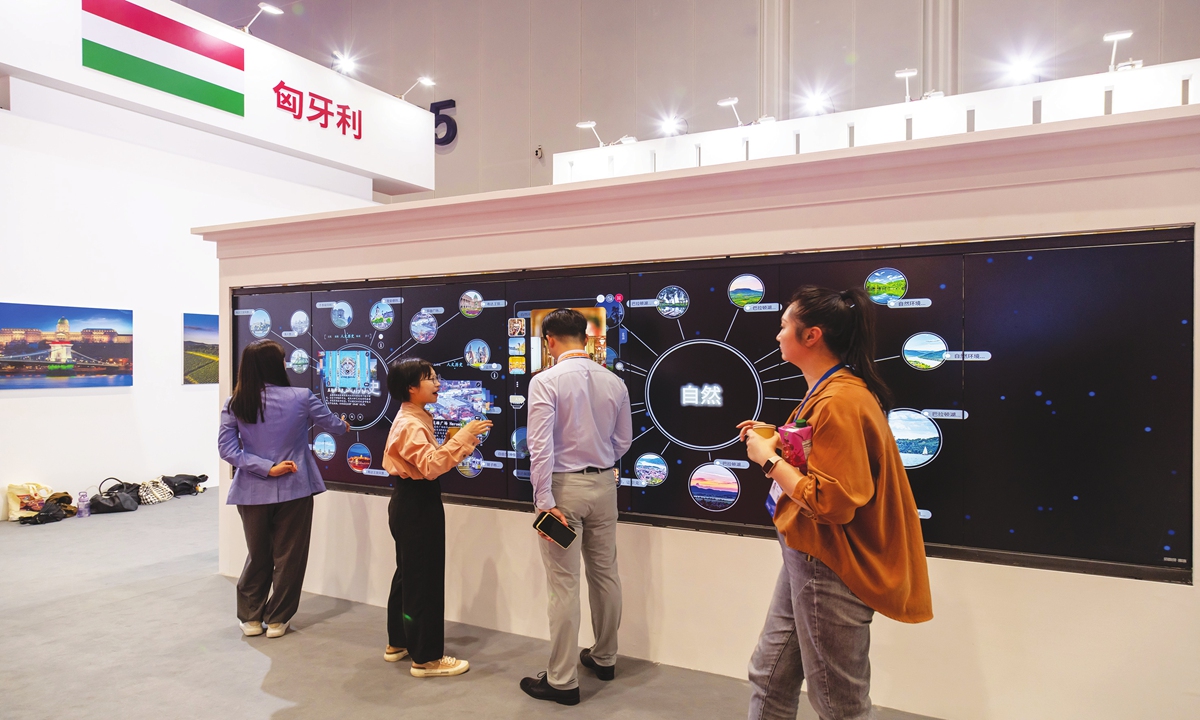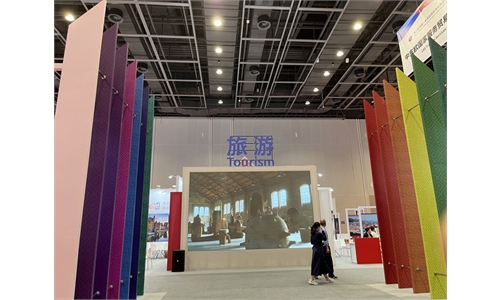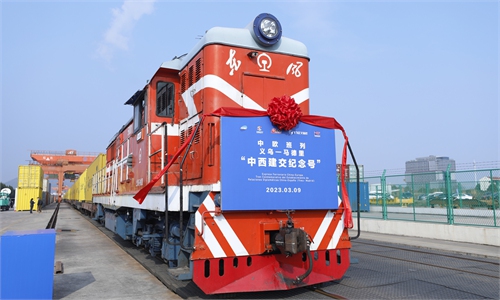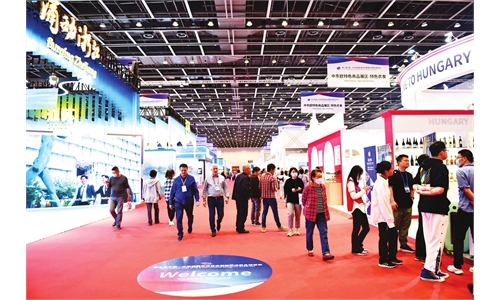BRI to become a bedrock of new world order: Hungarian scholar
Participating in BRI, Hungary makes marked gains in trade, infrastructure connectivity and more


Visitors experience the magic wall and enjoy the Hungarian landscape through touch at the Hungarian pavilion at the 3rd China-CEEC Expo in Ningbo, East China's Zhejiang Province,on May 16, 2023. Photo: VCG
Editor's Note:
This year marks the 10th anniversary of the China-proposed Belt and Road Initiative (BRI), a global cooperation platform that focuses on China's vision starting with infrastructure connectivity and provides solutions to the reform of the global governance system and multifaceted challenges. Against this backdrop, the Global Times is publishing a series of interviews with renowned scholars, think tanks, and financial institutions, sharing their insights and understanding of how the initiative has earned global recognition and reshaped global development. This is the seventh installment in the series.
Hungary is the first European country to participate in the BRI, and the country became the guest of honor in the five-day 3rd China-Central and Eastern European Countries (CEEC) Expo this year. The Global Times reporter Liu Yang (GT) conducted an interview with Levente Horváth (Horváth), the director of Eurasia Center of Hungary's John von
Neumann University. He shared his views on the development of BRI as well as the importance of the China-CEEC cooperation mechanism..

Levente Horváth Photo: Courtesy of Horváth
GT: Hungary is the first European country to participate in the BRI, and 2023 marks the 10th anniversary of the initiative. What has Hungary achieved under the BRI? What are the priorities and prospects for cooperation under the initiative in the next decade?
Horváth: Hungary was among the first countries in the world to establish diplomatic relations with China. Since then, the two countries have cooperated well in trade, economy, finance, culture and education.
In 2010, the Hungarian government announced the "Opening to the East" policy and started diversifying its international relations, strengthening cooperation with China.
While Hungary was opening to the East, China was opening its doors wider by launching a number of international cooperation platform, such as the BRI. The two countries' interests met, so Hungary was the first European country to join the China-proposed initiative.
One of the most famous BRI flagship projects is a Hungarian-Serbian infrastructure plan, the Budapest-Belgrade Railway. A stretch of the Belgrade-Budapest Railway that connects Belgrade and Novi Sad in Serbia marked its first anniversary in March. More than 50 passenger trains run every day in the section, carrying an average of 8,200 passengers per day.
Hungarian-Chinese trade has also increased in the past 10 years, and several big Chinese companies decided to establish their CEE headquarters in Hungary.
Hungarian-Chinese cooperation has been very fruitful in the past 10 years because both countries have a stable political and economic environment. Also, they have a common idea about the world order.
GT: What is the significance of the China-proposed BRI to the world?
Horváth: In the 21st century, we are witnessing the changing of the world order. During the past two decades, the unipolar world has been gradually transforming into a multipolar world. New economic areas and power centers of global importance have emerged, among them China is a rising star.
A growing number of countries have repeatedly announced that the world needs a multipolar world order instead of being ruled by one hegemonic country.
The BRI, with its 5 main priorities - policy coordination, infrastructure connectivity, unimpeded trade, financial integration, and connecting people - could be the basis of a new world order because, in the multipolar world order, it is not only a small group that decides about the international issues, but every country participates in the discussions.
The world also needs strong infrastructure connectivity so every country can be integrated into the world economy, and global trade can also develop the means to help every country to strengthen its own economy. Also, the world needs financial integration as currently only one currency dominates the global financial system.
In addition, the world needs connections between different civilizations and cultures. The different civilizations must know each other to cooperate better in every field.
We shouldn't look at the world or other countries only from our own perspective, using our own terminology and logic. We have to learn about each other's tradition, culture, history and religion, so we can understand better and will not misunderstand the other's internal and foreign policy.
So that is why I think the BRI is the basis of the new multipolar world order -- respecting each other, cooperating on the basis of mutual benefit, and discussing global issues with everybody's participation.
GT: This year marks the 11th anniversary of the launch of China- CEEC cooperation, how do you evaluate the economic and trade cooperation between China and CEECs? What is the basis for the deepening of economic and trade relations between the two sides?
Horváth: Last year, marking the 10th anniversary of the China-CEEC cooperation, our institution published a special edition entitled "Results and Challenges: 10 Years of China-CEEC Cooperation". In this book, we had articles about the economic and trade cooperation between China and the CEE countries.
These show that in the past 10 years, there was very good, increasing trade cooperation between China and the CEE countries; China-CEEC trade growth has averaged 8 percent annually since 2012, which is quite impressive.
China's direct investment in CEE countries rose by 148 percent year-on-year in the first quarter of this year. Major investment areas include auto parts, electric appliances, medicine, logistics, energy, minerals and others.
Most CEE countries have had a good relationship with China since 1949. Now in the framework of the China-CEEC platform, they could continue to deepen their cooperation with China.
GT: In the past two years, Lithuania, Estonia and Latvia have withdrawn from China-CEEC cooperation mechanism. How do you evaluate the move? Does it interfere with the cooperation between China and the CEECs? How do you evaluate the achievements of the China-CEEC cooperation mechanism?
Horváth: China-CEEC cooperation is a platform to strengthen the cooperation between the involved countries. It is not a military alliance or any other kind of alliance.
But because of the rapid rise of China and the changing world order, the Western superpower is afraid of losing its unipolar and hegemonic status, so some of them are demonizing China and putting pressure on their allies to go against China, even if it is not in their own national interests.
In some countries, there are examples of political forces coming to power that would reduce cooperation with China or even adopt aggressive anti-China posturing. This restricts the economic and trade opportunities of the countries involved.
However, this does not diminish the economic and geopolitical importance of the CEEC region but strengthens the role of countries where political stability guarantees investment security.
GT: The 3rd China-CEEC Expo was held from May 16 to 20 in China's Ningbo. The number of exhibitors at this year's expo increased by 30 percent compared to the previous one. What do you think the trade fair means for deepening cooperation between China and CEECs?
Horváth: I think the China-CEEC Expo is an excellent platform to understand each other more and strengthen cooperation in every field. Before, I also participated in the China-CEEC Expo in Ningbo as the Consul General of Hungary in Shanghai, it was our honor to be the guest of honor, and it is an even greater honor for us.
More than 3,000 exhibitors attended the trade event, showcasing 5,000 products; and purchasing orders worth 10.53 billion yuan ($1.5 billion) from CEECs were signed at the expo.
It is essential that in the China-CEEC cooperation, there are several conferences, forums, and expos where the participating members have the opportunity to understand better the way of thinking of others and also gather more knowledge about their culture and tradition.



